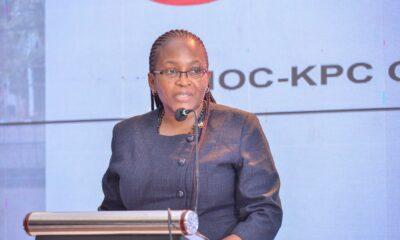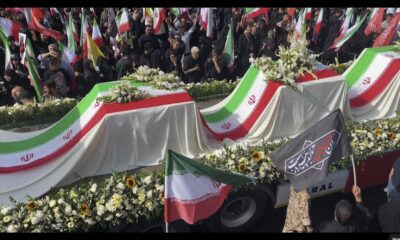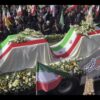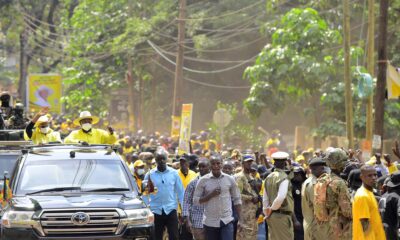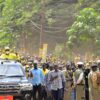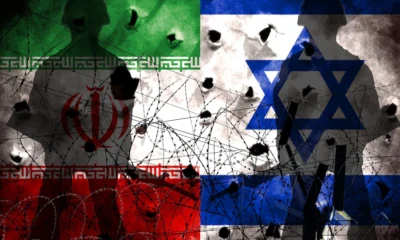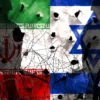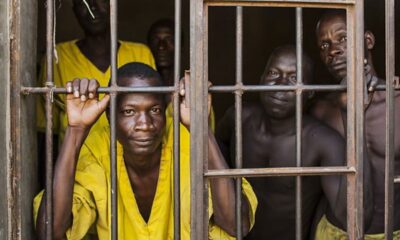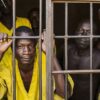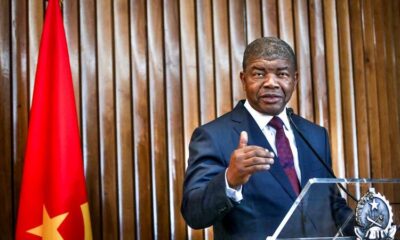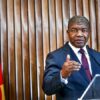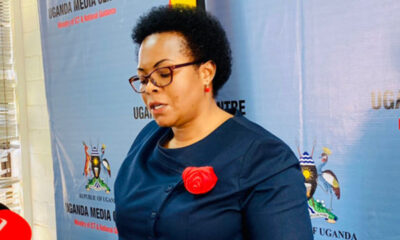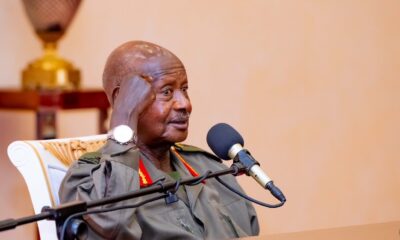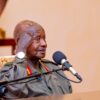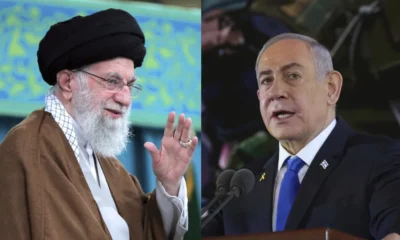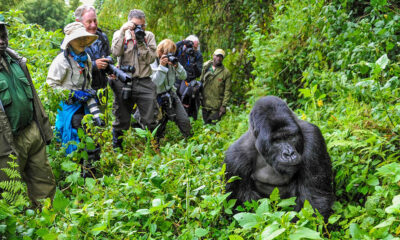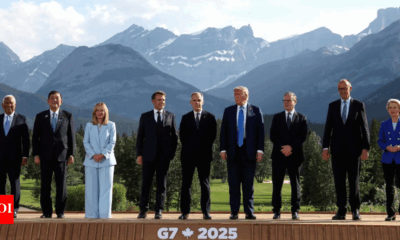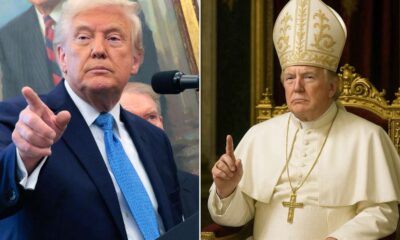Analysis
Rise in Military Coups; A cobweb of illegitimate gov’ts and foreign interference
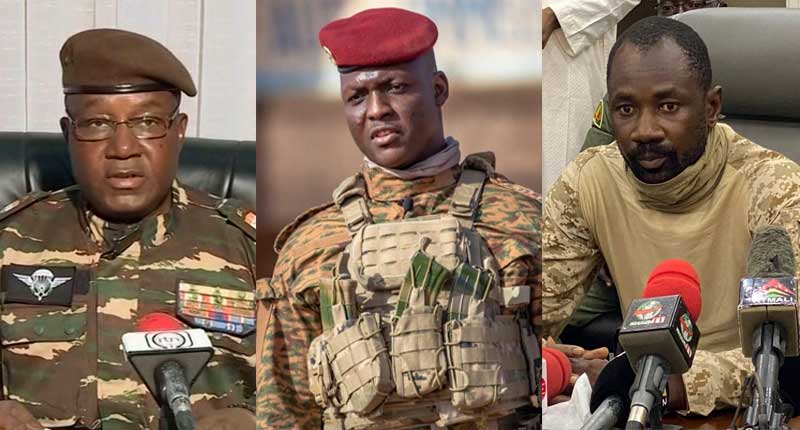
Photo Montage Left to Right Military Leaders of Niger Abdourahmane Tchiani, Burkina Faso’s Ibrahim Traore and Mali’s Assimi Goita
The latest military overthrow of an elected government in the Saharian desert country of Niger has extended the geographical area currently occupied by unelected armed leaders from the Red Sea to the opposite end of the continent at the shores of the Atlantic ocean.
From The Sudan in the East, to Chad through Niger to Mali and Guinea Conakry on the Atlantic Ocean, the red belt of unelected governments across Africa’s Sahel region is now complete. Burkina Faso, Mali’s southern neighbor is another of the new victims of military overthrow of elected leadership.
In Sudan, the military overthrew the Civilian Authority in 2019, even though factions within the same military ranks have since emerged in a bloody vie for power that has left thousands of civilians dead. Africa’s 3rd largest country is currently embroiled in a war between two armed groups loyal to different military leaders.
Sudan’s immediate neighbor in the west was the first to suffer from the curse of military overthrow of power when the country’s long-serving president Idriss Deby was killed in battle with rebels in April 2021.
His son Mahamat Idriss Deby Itno assumed power by replacing civilian authority with a military council. The military council promised to hold elections within 18 months, but they have since backtracked on their promises by pushing forward polls to two more years.
Even though the military council appointed a transitional civilian Prime Minister Saleh Kebzabo, the postponement of elections has derailed the return to democratic rule.
The reign of military governments gained traction in Mali shortly after Deby’s death. In May 2021, Col. Assimi Goita, assumed power in the second successful coup in a space of 12 months. An earlier coup had deposed President Ibrahim Boubacar Keita in 2020.
Mali’s neighbour in the South, Burkina Faso, have witnessed two coups recently. The first coup, led by Paul-Henri Damiba took place in January 2022 after soldiers claimed the elected president Blaise Campaore, who had himself come to power through a coup, had failed to stop islamist insurgents.
Damiba’s illegitimate rule was hence cut short in another coup that was led by Captain Ibrahim Traore – a 34 year old then, head of an artillery unit.
Traore claimed his military counterpart Damiba had failed to address the insecurity that was posed by the ISIL and Al-Qaeda insurgents.
The latest coup to complete the zone of military dominance across the Sahel happened last week – July 26, to be precise, when a Presidential guard, one Abdourahmane Tchiani declared himself President and arrested President Muhamed Bazoum.
The mutineers said they overthrew President Bazoum, who was elected two years ago in Niger’s first peaceful, democratic transfer of power since independence from France, because he wasn’t able to secure the nation from growing jihadi violence. But some analysts say that’s just a pretext for a takeover that is more about internal power struggles than securing the nation.
“Everybody is wondering why this coup? That’s because no one was expecting it. We couldn’t expect a coup in Niger because there’s no social, political or security situation that would justify that the military take the power,” Prof. Amad Hassane Boubacar, who teaches at the University of Niamey, told The Associated Press.
Boubacar is quoted as having said that Bazoum wanted to replace Tchiani, and is now in charge of the country. Tchiani was loyal to Bazoum’s predecessor and that sparked the problems, Boubacar said.
Will ECOWAS attack Niger?
The leaders of West Africa’s powerful regional block ECOWAS have threatened to intervene militarily if the junta in Niger don’t return Bazoum to power in one week.
France, Niger’s former colonial master with a lot of historic ties and other economic and military interests in Niger have vowed to support ECOWAS in any way possible to return to democracy.
ECOWAS’ anti-coup squad
The regional west African economic block – ECOWAS has mooted plans to create an anti-coup unit, to perhaps stop the contagion effect that the latest coups may have on the wider region.
The coming into power of Nigeria’s new President Bola Ahmed Tinubu has injected new impetus into the regional block ECOWAS’ peace keeping plans to prevent military coups from taking hold in west Africa.
But political analysts have rebuked the idea as an attempt by corrupt leaders to secure their illegitimate rule.
Some argue that the current crop of most African leaders occupy their seats illegitimately through repressive policies and maneuvers such as tampering with constitutions, election thefts and suppression of the opposition and freedom of speech.
Illegitimate leaders spark coups
Mama Kandeh, a Gambian politician and former Member of the Pan African Parliament representing his country, has put this better than anyone else.
“Before setting up an anti-coup d’etat unit by ECOWAS,” he said, “Is it time that African Heads of State or ECOWAS look into the reasons why there are Coup d’Etats in Africa? What are the root causes of coups, let them put their house in order, before they set up an anti-coup d’etats unit.
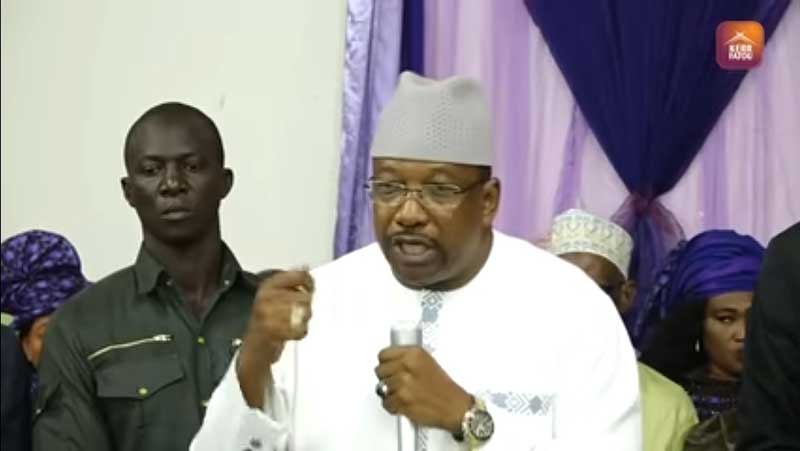
Outspoken Guinea politician Mama Kandeh called for an end to illegitimate govts
Kandeh added: “I believe their house is not in order. This unit is set up to protect only themselves not anybody else. What is more Coup d’etat that your national constitution giving you two-five year term limits, after serving for ten years, you change your constitution for another term. Is that not a coup d’Etat. Because you feel you have the powers to do that, the soldiers have the right to Coup d’etat. That is another coup d’etat.
“Putting on Civilian clothes, calling yourself a democrat, you loot all the resources of your country, mistreat people, torture them, imprison them, burn their businesses to ash, you call that democracy or a civilian rule?
Leaders must stop lying to their electorates first. They must stop the corruption. They must stop looting our resources, they must realize that they are not better than anybody else.”
Kandeh’s sharp criticism of African leaders has made waves on the internet. His views have been echoed by Liberia’s current president and Ballon d’Or winner George Weah who said: “As long as ECOWAS tolerates institutional coups that allow lifetime presidencies, and fraudulent declaration of election results, manipulation of judicial announcements, there will always be military coups. We cannot condemn military coups when we do not condemn those who carry out institutional coups.”
The former U.S Special Envoy for the Sahel region Peter Pham had long reached Kandeh’s observation when in 2020 while speaking at a briefing that was orgaised by the Wilson centre, said that the rise in coups in Africa, has its roots in the growing sense among the population that their governments are illegitimate and can no longer meet their needs.
Dr. Peter Pham said: “At the heart of the crisis in the Sahel, I believe, it’s ultimately a crisis of the state’s legitimacy. That is, whether or not citizens perceive that their government is legitimate, equitable, and able and willing to meet their needs. This includes ensuring justice and accountability for human rights violations and abuses committed by security forces. Without such a commitment, no degree of international engagement is likely to succeed. If states, especially security forces, continue to commit human rights violations or abuses it undermines their credibility with their own citizens and thus undermines their ability to counter violent extremism.”
Uganda’s own four-time presidential contender Dr. Kizza Besigye has supported the coup plotters for deposing leaders who impose their will over the people. Besigye said: “Niger Coup makers are right to tell off African leaders – who seek to protect their illegitimate hold onto power.”
Besigye added: “Many African leaders have overthrown their country’s constitution or the people’s will expressed in elections.”
But the latest military take-over in Niger, suggests there could be some external forces at play. For example, supporters of the military coup in Niamey, the Capital of Niger, waved and chanted Russia Russia. The Russian mercenary group Wagner already has a strong presence in Mali and it’s believed that Russian President Vladmir Putin wants to expand his influence in the region.
There are new reports that Tchiani’s new government has signed a deal with the Russian mercenary group Wagner for protection.
But is illegitimacy adequate for coup d’etat?
Subverting constitutions and suppression of popular dissent are not unique to West Africa. All across the continent, strong military rule is the order of the day.
The situation in Zimbabwe, Uganda and other countries in Eastern and Southern Africa suggests that discontent among the population is not the only reason soldiers overthrow elected leaders, and yet coup d’etats don’t manifest the way they do in West Africa.
Some like Captain Mike Mukula, one of Uganda’s prominent businessmen, have argued that a lack of strong control over the army by the heads of state gives rise to coups more easily in West Africa than other countries on the continent.
Fight against colonial France?
There is lingering sense of resentment against France’s continued domination of the political and economic affairs of many West African countries, which is not the case in other African countries.
As one Dr. Arikana Chihombori-Quao, the Zimbabwean former African Union envoy to the United States, once observed: “France did something absolutely deplorable. They made the countries of west Africa sign a document which they called the pact for the continuation of colonisation.”
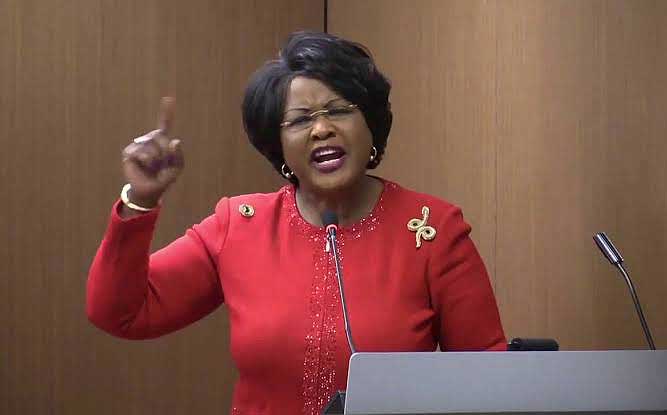
Zimbabwean Dr. Arikana Chihombori-Quao
“Two countries said, no way, we aren’t doing this. Guinea and Mali refused. The french couldn’t understand it. how on earth could an African country dare not to be affiliated with France. In their anger, history tells us that they went into those two countries, took everything that they thought they had brought, proceeded to pour concrete into the see with pipes, completely devastating the two economies. This was also done as a way of letting other countries know that should you refuse to sign this document, this is the fate that awaits you. So the rest of the countries signed the pact for the continuation of colonisation.
What is special about this pact? “It said, you shall deposit 85% of your bank reserves with the French Central Bank under the control of the French Minister of Finance, The french government will collectively take all your money, invest it into the French stock market under the French name and you don’t have know what the returns are. Should you wish to access some of your money, you have to submit your countries financial report, and if approved, you get to access up to 20% of the previous financial year as a loan at commercial interest rates.” “To date, countries are still depositing their monies with France.”
“They also said all the minerals discovered and yet to be discovered, French companies have the first right of refusal. You go to those countries today, French companies have the first right of refusal. Water supply, power supply, the mining fixtures.
“They also said, your military can only be trained by France. France shall have military presence in your country and France shall invade your country without notice if France feels its interests in your country are being violated.
The sense of resentment in French West Africa is believed to have accounted for the high number of coups.
Continuing scramble for Africa’s resources
Niger is Africa’s biggest producer of Uranium – a vital energy resource but also a key input into the nuclear weapons desired by Russia and other super powers.
Niger holds large reserves of uranium with as many as 30 French companies active in the country covering all economic sectors, particularly in services, distribution and in the mining sector. One out of three lightbulbs in France is powered by uranium from Niger, where 90% of the people lack electricity.
Niger, which has Africa’s highest-grade uranium ores, produced 2,020 metric tons of uranium in 2022, about 5% of world mining output, according to the WNA
The Russian mercenary outfit Wagner, led by Yevgeny Prigozhin that is active in Africa, claimed credit for the coup Thursday.
“What happened is the struggle of the people of Niger against the colonialists,” Prigozhin said in a voice message posted in a Wagner-branded Telegram channel. “This is actually gaining independence and getting rid of the colonialists.”
“This shows the effectiveness of Wagner,” Prigozhin continued. “A thousand Wagner fighters are able to restore order and destroy terrorists, preventing them from harming the civilian population of states.”
The same channel also posted a photo of Prigozhin shaking hands with an unidentified man on the sidelines of a Russia-Africa summit being hosted in St Petersburg by President Vladimir Putin.
France and US role
The US and France have extensive military bases in Niger, which they use to launch counter attacks against Al-Qaida and ISIL. The ongoing battle between Russia and the West in Ukraine may be expanding in other geographical spheres, especially over the control of resources such as Uranium.
In final analysis, a combination of factors ranging from extensive foreign interfearence by the super-powers, illegitimate leaders and weak control over the military appears to conspire to make west Africa vulnerable to coups.
Comments



